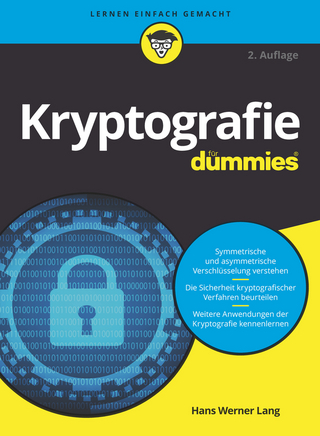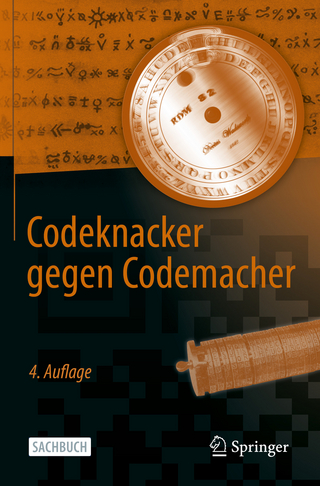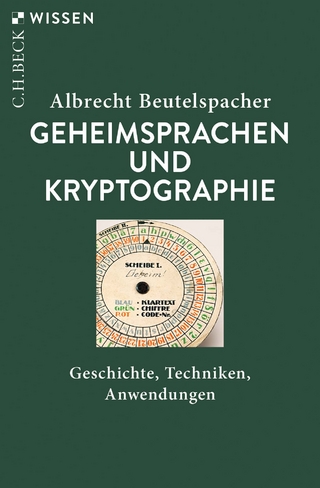
Turbo Codes
Springer (Verlag)
978-0-7923-7868-6 (ISBN)
This book grew out of our research, industry consulting and con tinuing education courses. Turbo coding initially seemed to belong to a restricted research area, while now has become a part of the mainstream telecommu nication theory and practice. The turbo decoding principles have found widespread applications not only in error control, but in de tection, interference suppression and equalization. Intended for use by advanced students and professional engi neers, involved in coding and telecommunication research, the book includes both basic and advanced material. The chapters are se quenced so that the knowledge is acquired in a logical and progres sive way. The algorithm descriptions and analysis are supported by examples throughout the book. Performance evaluations of the presented algorithms are carried out both analytically and by sim ulations. Basic material included in the book has been taught to students and practicing professionals over the last four years in the form of senior undergraduate or graduate courses, lecture series and short continuing education courses.
1 Introduction.- 1.1 Digital Communication System Structure.- 1.2 Fundamental Limits.- 2 Block Codes.- 2.1 Block Codes.- 2.2 Linear Systematic Block Codes.- 2.3 Parity Check Matrix.- 2.4 The Minimum Distance of a Block Code.- 2.5 Maximum Likelihood Decoding of Block Codes for a BSC Channel.- 2.6 Maximum Likelihood Decoding of Block Codes for a Gaussian Channel.- 2.7 Weight Distribution of Block Codes.- 2.8 Performance Upper Bounds.- 2.9 Coding Gain.- 2.10 Soft Decision Decoding of Block Codes.- 2.11 Trellis Structure of Linear Binary Block Codes.- 3 Convolutional Codes.- 3.1 Introduction.- 3.2 The Structure of (n,1)Convolutional Codes.- 3.3 The Structure of (n,k) Convolutional Codes.- 3.4 Systematic Form.- 3.5 Parity Check Matrix.- 3.6 Catastrophic Codes.- 3.7 Systematic Encoders.- 3.8 State Diagram.- 3.9 Trellis Diagram.- 3.10 Distance Properties of Convolutional Codes.- 3.11 Weight Distribution of Convolutional Codes.- 3.12 Punctured Convolutional Codes.- 4 Turbo Coding Performance Analysis and Code Design.- 4.1 Introduction.- 4.2 Turbo Coding.- 4.3 Performance Upper Bounds of Turbo Codes.- 4.4 Turbo Code Performance Evaluation.- 4.5 Turbo Code Design.- 4.6 Serial Concatenated Convolutional Codes.- 5 Trellis Based Decoding of Linear Codes.- 5.1 Introduction.- 5.2 System Model.- 5.3 Optimization Criteria.- 5.4 The Viterbi Algorithm.- 5.5 The Bidirectional Soft Output Viterbi Algorithm ..- 5.6 Sliding Window SOVA.- 5.7 The MAP Algorithm.- 5.8 The Max-Log-MAP Algorithm.- 5.9 The Log-MAP Algorithm.- 5.10 Comparison of Decoding Algorithms.- 6 Iterative Decoding.- 6.1 Optimum Decoding of Turbo Codes.- 6.2 Iterative Decoding of Turbo Codes Based on the MAP Algorithm.- 6.3 The Effect of the Number of Iterations on Turbo Code Performance.- 6.4 The Effect of Interleaver Size onTurbo Code Performance.- 6.5 The Effect of Puncturing Component Codes on Turbo Code Performance.- 6.6 Comparison Between Analytical Upper Bounds and Simulation Results.- 6.7 Asymptotic Behavior of Turbo Codes.- 6.8 Iterative SOVA Decoding of Turbo Codes.- 6.9 Comparison of MAP and SOVA Iterative Decoding Algorithms.- 6.10 Iterative MAP Decoding of Serial Concatenated Convolutional Codes.- 6.11 Iterative SOVA Decoding of Serial Concatenated Convolutional Codes.- 6.12 Serial Concatenated Convolutional Codes with Iterative Decoding.- 7 Interleavers.- 7.1 Interleaving.- 7.2 Interleaving with Error Control Coding.- 7.3 Interleaving in Turbo Coding.- 7.4 Block Type Interleavers.- 7.5 Convolutional Type Interleavers.- 7.6 Random Type Interleavers.- 7.7 Code Matched Interleavers.- 7.8 Design of Code Matched Interleavers.- 7.9 Performance of Turbo Codes with Code Matched Interleavers.- 7.10 Performance of Turbo Codes with Cyclic Shift Interleavers.- 8 Turbo Coding for Fading Channels.- 8.1 Introduction.- 8.2 Fading Channels.- 8.3 Statistical Models for Fading Channels.- 8.4 Capacity of Fading Channels.- 8.5 Performance Upper Bounds on Fading Channels.- 8.6 Iterative Decoding on Fading Channels.- 8.7 Performance Simulation Results on Fading Channels.- 9 Turbo Trellis Coded Modulation Schemes.- 9.1 Introduction.- 9.2 Binary Turbo Coded Modulation.- 9.3 Turbo Trellis Coded Modulation.- 9.4 I-Q Turbo Coded Modulation for Fading Channels.- 10 Applications of Turbo Codes.- 10.1 Turbo Codes for Deep Space Communications . . ..- 10.2 Turbo Codes for CDMA2000.- 10.3 Turbo Codes for 3GPP.- 10.4 Turbo Codes for Satellite Communications.
| Reihe/Serie | The Springer International Series in Engineering and Computer Science ; 559 |
|---|---|
| Zusatzinfo | XXVI, 312 p. |
| Verlagsort | Dordrecht |
| Sprache | englisch |
| Maße | 155 x 235 mm |
| Themenwelt | Mathematik / Informatik ► Informatik ► Netzwerke |
| Informatik ► Theorie / Studium ► Kryptologie | |
| Mathematik / Informatik ► Mathematik | |
| Technik ► Elektrotechnik / Energietechnik | |
| ISBN-10 | 0-7923-7868-7 / 0792378687 |
| ISBN-13 | 978-0-7923-7868-6 / 9780792378686 |
| Zustand | Neuware |
| Haben Sie eine Frage zum Produkt? |
aus dem Bereich


